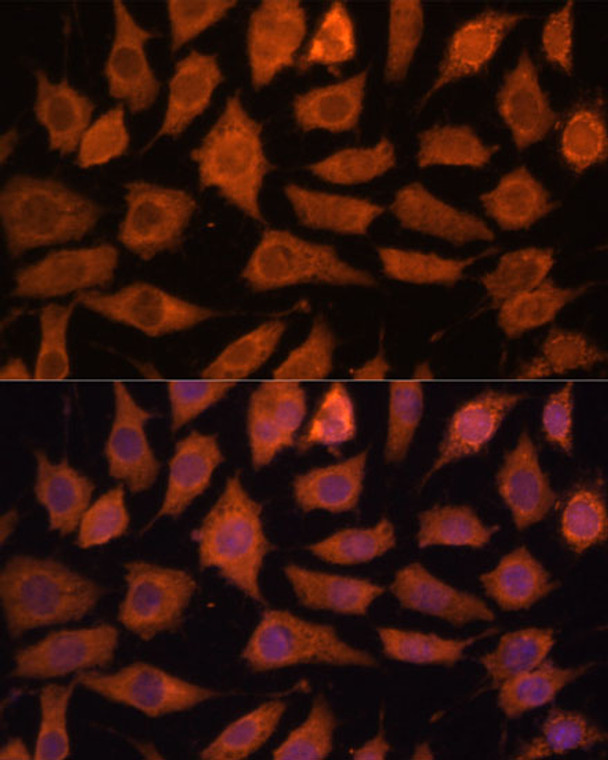| Host: |
Rabbit |
| Applications: |
WB/IHC/IF |
| Reactivity: |
Human/Mouse/Rat |
| Note: |
STRICTLY FOR FURTHER SCIENTIFIC RESEARCH USE ONLY (RUO). MUST NOT TO BE USED IN DIAGNOSTIC OR THERAPEUTIC APPLICATIONS. |
| Short Description: |
Rabbit polyclonal antibody anti-LGMN (26-288) is suitable for use in Western Blot, Immunohistochemistry and Immunofluorescence research applications. |
| Clonality: |
Polyclonal |
| Conjugation: |
Unconjugated |
| Isotype: |
IgG |
| Formulation: |
PBS with 0.05% Proclin300, 50% Glycerol, pH7.3. |
| Purification: |
Affinity purification |
| Dilution Range: |
WB 1:500-1:1000IHC-P 1:50-1:200IF/ICC 1:50-1:200 |
| Storage Instruction: |
Store at-20°C for up to 1 year from the date of receipt, and avoid repeat freeze-thaw cycles. |
| Gene Symbol: |
LGMN |
| Gene ID: |
5641 |
| Uniprot ID: |
LGMN_HUMAN |
| Immunogen Region: |
26-288 |
| Immunogen: |
Recombinant fusion protein containing a sequence corresponding to amino acids 26-288 of human Legumain (LGMN) (NP_005597.3?). |
| Immunogen Sequence: |
GGKHWVVIVAGSNGWYNYRH QADACHAYQIIHRNGIPDEQ IVVMMYDDIAYSEDNPTPGI VINRPNGTDVYQGVPKDYTG EDVTPQNFLAVLRGDAEAVK GIGSGKVLKSGPQDHVFIYF TDHGSTGILVFPNEDLHVKD LNETIHYMYKHKMYRKMVFY IEACESGSMMNHLPDNINVY ATTAANPRESSYACYYDEKR STYLGDWYSVNWMEDSDVED LTKETLHKQYHLVKSHTNT |
| Tissue Specificity | Ubiquitous. Particularly abundant in kidney, heart and placenta. |
| Post Translational Modifications | Activated by autocatalytic processing at pH 4. |
| Function | Has a strict specificity for hydrolysis of asparaginyl bonds. Can also cleave aspartyl bonds slowly, especially under acidic conditions. Involved in the processing of proteins for MHC class II antigen presentation in the lysosomal/endosomal system. Also involved in MHC class I antigen presentation in cross-presenting dendritic cells by mediating cleavage and maturation of Perforin-2 (MPEG1), thereby promoting antigen translocation in the cytosol. Required for normal lysosomal protein degradation in renal proximal tubules. Required for normal degradation of internalized EGFR. Plays a role in the regulation of cell proliferation via its role in EGFR degradation. |
| Protein Name | LegumainAsparaginyl EndopeptidaseAepProtease - Cysteine 1 |
| Database Links | Reactome: R-HSA-1679131Reactome: R-HSA-196791Reactome: R-HSA-2132295 |
| Cellular Localisation | Lysosome |
| Alternative Antibody Names | Anti-Legumain antibodyAnti-Asparaginyl Endopeptidase antibodyAnti-Aep antibodyAnti-Protease - Cysteine 1 antibodyAnti-LGMN antibodyAnti-PRSC1 antibody |
Information sourced from Uniprot.org
12 months for antibodies. 6 months for ELISA Kits. Please see website T&Cs for further guidance










